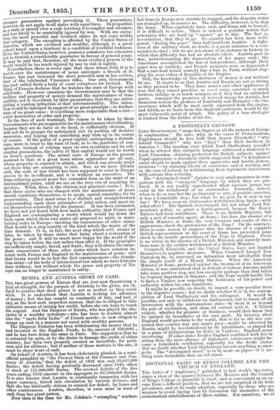RUSSIA AND AUSTRIA SHORT OF CASH.
TrE two great powers of Europe that are just now threatening a trial of strength, for the purpose of dictating to the globe are ob- liged to confess that their power is not so perfect as they could wish. It is understood that Austria is seeking for advances of money ; but she has sought so constantly of late, and had, if any, at the best such imperfect success, that she is obliged to take elaborate means of raising her credits before she can hope to touch the argent. And the Emperor of Russia, who has played the cha- racter of a wealthy potentate—who has been to Austria almost like the "uncle from India" of French novels—is now obliged to scrape up cash in a manner not usual with wealthy persons.
The Emperor Nicholas has been withdrawing the money that he had invested in the English Funds, to the amount of 800,0001.; and he has been doing the same in Paris. The supposition that he is actuated by spite, or by the desire to damage the credit of either country, has been very properly scouted as incredible, for petti- ness and for silliness ; but if neither of those motives is the one, it must be sheer want of cash.
On behalf of Austria, it has been elaborately pleaded, in a semi- official pamphlet on "the Present State of the Finances and Cur- rency of Austria," that the deficit of 1852 was only 53,447,000 florins; the deficit having gradually decreased since 1849, when it stood at 121,000,000 forms. The avowed deficits of the five years ending 1852 amount in the aggregate to 337,000,000 florins. It is also known that Austria is continually tampering with her paper currency, forced into circulation by various devices; and that she has habitually striven to conceal her deficit, by loans and other contrivances. Austria, therefore, is even more in want of cash than her great patron. Now then is the tune for Mr. Cobden's "crumpling" warfare. Let loans to Russia or to Austria be stopped, and the despotic states are crumpled up, he assures us. The difficulty, however, is to stop the loans. When capitalists have cash, and kings ask to borrow, it is difficult to refuse. There is indeed a popular notion that potentates who are hard up " cannot" go to war. The fact is, nevertheless, that they do go. No country has been more belli- gerent "during the peace" than half-insolvent Austria. A tight- ness of the military chest, no doubt, is a great nuisance to a com- mander-in-chief; but we are not aware of an instance in history in which that difficulty has had an absolute effect. Austria goes to war, notwithstanding the depreciation of her paper cash ; the Americans accomplished the war of independence, although their paper was as rubbish; and French assignats were so depreciated that a cart-load would scarcely buy a bun in Paris, without stop- ping the wars either of Republic or the Empire. Still, the knowledge of this shortness of money is not without its use. It shows to us that Austria and Russia are not so strong as they pretend to be. They have armies and other appliances of war, but they cannot purchase so muck army, construct so much fortress, indulge in so much intrigue, as if they had an unlimited purse. Amongst the promises of revived means for Austria, her financiers reckon the produce of Lombardy and Hungary ; the two provinces which will be most easily separated from the empire, and which, as we learn from this financial confession, would be the most vulnerable point of attack. The policy of a true strategist is learned from the foibles of his foe.




































 Previous page
Previous page